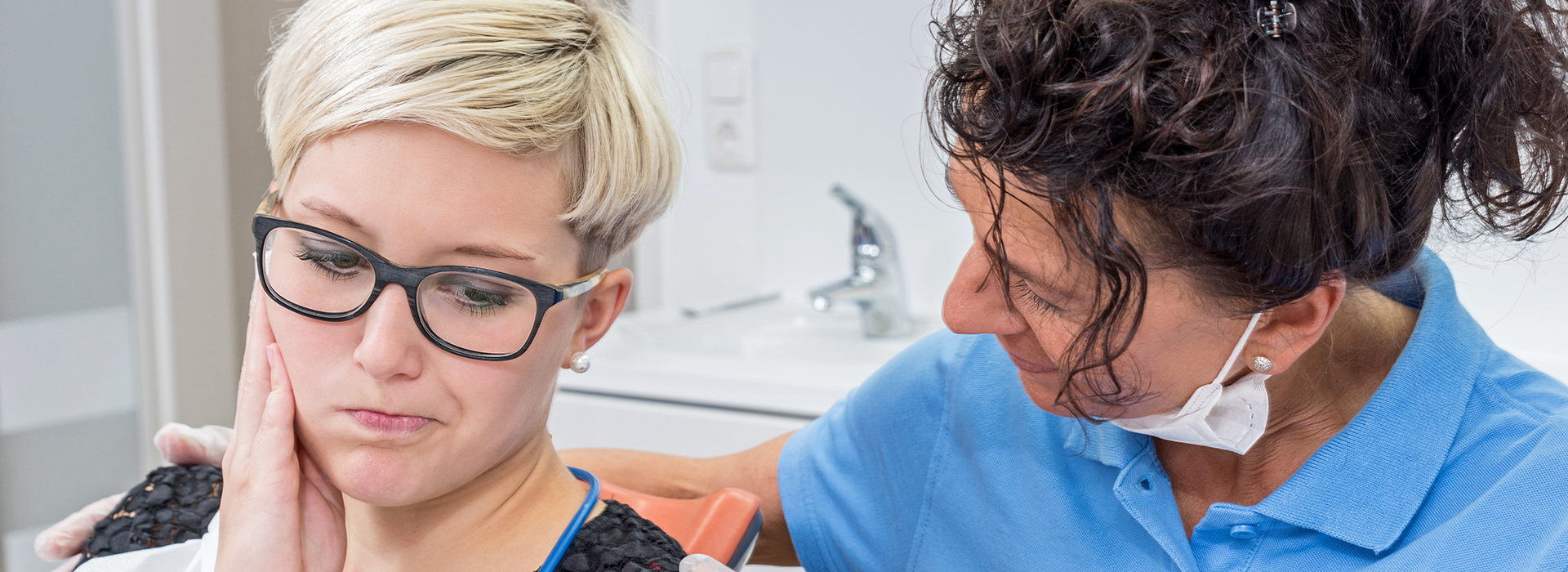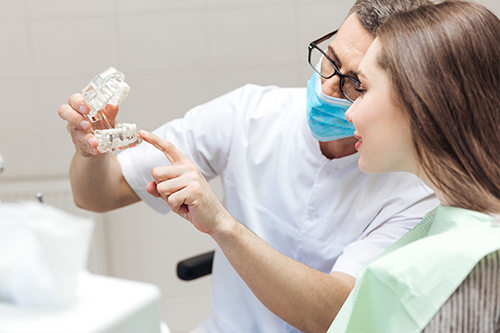
Dental emergencies range from problems that threaten the survival of a tooth to conditions that can affect your overall health. Severe, unrelenting pain, rapid swelling around the jaw or face, heavy bleeding that doesn’t stop with gentle pressure, or a tooth that has been completely knocked out are all situations that warrant immediate attention. Some issues — like a loose filling that suddenly exposes a sensitive tooth nerve — can quickly escalate if left untreated.
Not every unpleasant dental symptom requires emergency care, but there are clear signs to watch for. Fever or difficulty breathing or swallowing accompanying oral pain can signal an infection spreading beyond the mouth and should be addressed without delay. Sudden changes in bite, severe trauma to the face or jaw, or persistent numbness are other indicators that an urgent evaluation is necessary.
Understanding the difference between urgent and non-urgent problems helps you get the right care at the right time. When in doubt, seeking prompt professional assessment is the safest option — early intervention often preserves more of the natural tooth and prevents complications. The goal is to stop pain, control infection, and stabilize the situation so a thoughtful, long-term plan can follow.
There are simple, effective measures to reduce pain and limit damage while you arrange to see a dentist. For bleeding, apply clean gauze or a tea bag and gentle pressure to the area; avoid rinsing aggressively. For swelling, a cold compress applied briefly to the outside of the cheek helps limit inflammation and provides pain relief. Over-the-counter pain relievers can be used as directed unless you have a medical reason to avoid them.
If a whole tooth has been knocked out, quick action can save it. Carefully pick up the tooth by the crown (not the root), rinse it gently with water if dirty, and try to reinsert it into the socket if possible. If reinsertion isn’t feasible, store the tooth in milk or a tooth preservation solution and seek emergency care immediately — the likelihood of successful re-implantation decreases with time.
For broken restorations or a fractured tooth, collect any broken fragments and bring them with you. Avoid hard foods and don’t attempt to trim jagged edges; dental wax or sugar-free gum can temporarily cover sharp areas to protect your tongue and cheeks. If you suspect an infection, avoid heat on the area and get evaluated promptly — infections can spread and require coordinated medical and dental treatment.
At your emergency appointment, the team will prioritize your comfort and safety while establishing the facts of what happened and how severe the condition is. Triage typically begins with a focused history and an exam to assess pain levels, swelling, bleeding, and any visible trauma. Digital imaging may be used to evaluate fractures, root integrity, and the presence of underlying infection.
Pain control is an early focus: clinicians may use local anesthetics, prescribe appropriate medications, or provide techniques to manage anxiety so you can be examined and treated effectively. If signs of a spreading infection or systemic involvement are present, antibiotics or a referral for medical evaluation may be recommended as part of initial management. Stabilizing the situation often happens on the same visit so you have immediate relief and a clear next step.
After the urgent issue is managed, your dentist will discuss treatment options tailored to your needs — from conservative restorations that preserve tooth structure to more definitive care like endodontic therapy or surgical intervention. The emergency visit is designed to address immediate threats and lay out a safe, evidence-based plan to restore function and aesthetics over the coming weeks.
Emergency dentistry uses a range of treatments aimed at preserving teeth and oral health. A cracked or chipped tooth may be smoothed and bonded to protect the exposed layer beneath the enamel. Loose or fallen restorations can often be reset or replaced temporarily to protect the remaining tooth structure and reduce sensitivity. In cases where decay or trauma has reached the tooth’s nerve, root canal therapy is commonly performed to remove infected tissue and preserve the natural tooth.
Severe infections may require drainage and antibiotics as an immediate step, followed by targeted dental treatment to remove the source of infection. When a tooth cannot be saved because of extensive damage or structural failure, extraction may be the safest option; modern techniques minimize trauma and prioritize future restorative possibilities. Stabilization — such as splinting a loose tooth after an injury — can also be an important interim measure while healing occurs.
For patients facing tooth loss after an emergency, a coordinated restorative plan can follow once the acute phase resolves. Options include fixed bridges, removable prostheses, and dental implants to return function and appearance. These solutions are chosen based on the patient’s oral health, anatomy, and long-term goals, allowing replacement that is both durable and natural-looking.
Throughout emergency care, preserving comfort and function is balanced with protecting long-term oral health. Immediate procedures often focus on controlling pain and infection, while follow-up appointments complete restorations and monitor healing so your smile can be fully restored in a predictable way.
Recovery after emergency dental treatment requires attentive aftercare. Follow all instructions for medications and wound care, keep follow-up appointments for definitive treatment, and watch for signs of complications such as increasing pain, fever, or unusual swelling. Maintaining good oral hygiene and following dietary recommendations during healing will support recovery and reduce the risk of further problems.
Once the immediate issue is resolved, your dentist will review preventive strategies tailored to you. This may include protective appliances like custom mouthguards for sports, targeted restorations to reduce risk of future fractures, or adjustments to restorative work that has become vulnerable. Regular dental exams and early treatment of small concerns lower the likelihood of an urgent problem developing unexpectedly.
Special consideration is given to children, older adults, and medically complex patients, where coordination with pediatricians or physicians may be necessary. If dental anxiety is a barrier to care, discuss calming techniques or sedation options with your dental team so that urgent and preventive care can be delivered safely and with minimal stress.
Proactive communication with your dental office makes a difference in emergency situations. Clear guidance on what to do immediately, what to bring to an appointment, and how follow-up will be managed helps patients feel prepared and supported throughout the process. Fay Hu General Dentistry emphasizes timely, evidence-based care designed to relieve pain, control infection, and restore oral health efficiently and compassionately.
In summary, dental emergencies are varied but manageable with prompt, informed action. Recognize the warning signs, take sensible first-aid steps, and seek professional evaluation quickly — early care preserves teeth and prevents complications. If you have questions or need urgent attention, please contact us for more information and guidance on next steps.


Pain is your body's way of signaling that something is not quite right and though there are many reasons for oral pain, one of the most common complaints and reasons for seeking urgent dental care is a toothache. Whether you simply need a dental filling, a crown, or require a root canal procedure to save your tooth, we'll alleviate your discomfort and restore the look and function of the involved tooth.

Dental trauma can result in a defect as minor as a small chip in tooth enamel to a more extensive and painful crack or fracture. With sufficient force, a tooth can even be displaced or completely knocked out of its socket. With prompt emergency care, many injured teeth can be restored and saved.

The last teeth in your mouth to develop, wisdom teeth often do not have enough room to fully erupt or may be positioned in the wrong direction. These issues can affect your dental health as well as overall well-being. Our office provides skilled care to address the complications caused by problematic wisdom teeth.

A broken or lost dental prosthesis or restoration can cause embarrassing gaps in your smile as well as compromise your ability to eat and speak with ease. If you've lost or broken a dental filling, denture, crown, or other dental appliance, you can rely on our office to perform a prompt repair or provide a durable and cosmetically pleasing replacement as quickly as possible.
At the office of Fay Hu General Dentistry, emergency appointments are always available. Of course, in addition to providing top treatment for dental emergencies, we also welcome patients searching for high quality and affordable care. We offer a complete range of the latest and best cosmetic and dental services for every member of your family.
If you are suffering from a toothache or have sustained a dental injury, it is important to visit the dentist as soon as possible before more serious complications arise. Whether your dental emergency is painful, if it affects the appearance of your smile, or if you suspect that an infection is present, our office will make every effort to see you as promptly as possible for care.
At the office of Fay Hu General Dentistry, we treat your dental emergency as our top priority. Our caring team will respond to your emergency call right away, making sure you get the gentle, state-of-the-art care you need without delay.
As your trusted emergency dentist in Winter Park, we provide the highest quality of care to mitigate the stress, anxiety, and discomfort of dental problems. Our dedicated team will help you start feeling better as soon as we receive your emergency call.
At the office of Fay Hu General Dentistry, we provide skilled and experienced care to effectively resolve a broad range of dental emergencies, restoring a patient's oral health while protecting their overall wellbeing.
However, even so, specific dental emergencies pose significant threats to one's health. These situations require immediate, emergency room care. Serious and potentially life-threatening dental emergencies include significant oral and facial trauma such as jaw fractures, deep wounds or lacerations to the face and mouth, an abscess or infection that causes widespread facial or submandibular swelling, or affects breathing and swallowing.
At the office of Fay Hu General Dentistry, we provide prompt, skilled, and experienced care to address dental emergencies. We understand that finances are always a concern and do our best to provide options in care that are both affordable and respect your budget.
Once we've had the opportunity to examine your smile, we can give you a clear picture of any existing dental issues, along with a quote for what the cost of treatment will be. The cost of care all depends upon the extent and complexity of issues affecting the health or appearance of your smile and the types of procedures that are required.
To help alleviate any additional stress or delay, you can count on our staff to work with you to optimize coverage for your dental care and to minimize your out-of-pocket expenses. For patients without insurance, we strive to make things easier as well! We invite you to visit our financial information page or speak to an expert in our business office.
Dental emergencies are often painful and debilitating experiences. For this reason it's important to have an emergency dentist in Winter Park, who welcomes patients with urgent dental needs while providing the prompt care required to restore oral health.
Here are just some of the reasons why so many patients choose our office for emergency dental care and to meet their family's dental needs:
We're dedicated to helping patients enjoy good oral health and beautiful smiles. We look forward to helping you keep your smile in tip-top condition. You can rest assured that our highly skilled office team will provide you the highest quality of state-of-the-art dental care and have you smiling again in no time!
To make an appointment or for more information on our office and the many state-of-the-art services we provide, give us a call today.
A dental emergency is any oral condition that requires prompt attention to relieve severe pain, stop bleeding, prevent infection, or save a tooth. Common examples include a knocked-out tooth, intense toothache, uncontrolled oral bleeding, a swelling that affects breathing or swallowing, and traumatic injuries to the mouth or jaw. Urgent attention is also needed for signs of spreading infection such as high fever, increasing facial swelling, or difficulty opening the mouth.
Not every dental problem is an emergency, but if you are unsure, err on the side of caution and call your dental provider. Timely evaluation reduces the risk of permanent damage and often simplifies treatment. Our team recommends contacting your dentist right away when symptoms are severe, persistent, or rapidly worsening.
If a permanent tooth is completely knocked out, quick action can increase the chance of saving it. First, hold the tooth by the crown (the top part) and gently rinse off dirt with saline or milk if available; do not scrub or remove attached tissue. If possible, reinsert the tooth into the socket and hold it in place or place the tooth in a container of milk or saline and get to the dentist immediately.
If you cannot reinsert the tooth, keep it moist and bring it to the dental office within one hour for the best chance of reattachment. Apply gentle pressure to control bleeding and use a cold compress to reduce swelling. The dentist will evaluate the tooth and surrounding tissues and determine whether reimplantation, splinting, or other treatment is appropriate.
For severe toothache or swelling, begin with conservative home measures to reduce pain and inflammation while arranging urgent care. Rinse your mouth with warm saltwater to help cleanse the area and gently remove debris, then apply a cold compress to the cheek for 10- to 15-minute intervals to reduce swelling. Over-the-counter analgesics such as acetaminophen or ibuprofen can help manage pain when taken according to label instructions, but avoid placing aspirin directly on the gum or tooth.
Avoid chewing on the affected side and stick to soft foods until you are evaluated. If you notice fever, rapidly increasing swelling, difficulty breathing or swallowing, or drainage of pus, seek immediate attention as these can signal a spreading infection. When you arrive at the dentist, bring a list of medications and a brief description of how symptoms began and progressed to aid diagnosis and treatment planning.
The emergency room is the appropriate choice when a dental issue is part of a life-threatening condition or when medical stabilization is required. Go to the ER if you have trouble breathing, difficulty swallowing, uncontrolled bleeding that does not respond to pressure, or extensive facial trauma that may involve the jaw, eye, or skull. Severe systemic signs such as high fever, rapid heart rate, or fainting also warrant emergency medical assessment.
For localized dental pain, a lost crown, or a broken tooth without systemic symptoms, contact your dentist first for urgent dental care. The dental office is better equipped to diagnose and definitively treat many oral problems, while the ER can provide interim measures such as antibiotics, pain control, or a referral to dental services when needed.
During an emergency visit to Fay Hu General Dentistry, the team will prioritize rapid assessment and patient comfort to address pain, infection risk, and tooth stability. Expect a focused medical and dental history, a clinical exam, and necessary imaging such as digital radiographs or 3D imaging if indicated to evaluate the extent of injury or disease. The clinician will explain findings, discuss immediate treatment goals, and outline follow-up or restorative options.
Treatment may include temporary measures to control pain and infection, reattachment or splinting of injured teeth, drainage of abscesses, placement of temporary restorations, or expedited definitive care such as root canal therapy or extraction when indicated. The practice emphasizes gentle care and uses modern diagnostic and treatment technology to ensure precise, comfortable outcomes and clear communication about next steps.
The need for a root canal or extraction depends on the severity of damage and whether the tooth's nerve (pulp) is infected or irreversibly injured. If trauma or deep decay has exposed or infected the pulp, root canal therapy can often save the natural tooth by removing inflamed tissue, disinfecting the canal system, and sealing it to prevent reinfection. Root canal treatment has a high success rate and is frequently the preferred option for preserving tooth structure and function.
Extraction is recommended when the tooth cannot be safely restored, when infection is uncontrolled, or when the structural damage makes long-term success unlikely. If extraction is necessary, the dentist will review replacement options such as implants, bridges, or removable prostheses and coordinate timely restorative planning to restore chewing function and esthetics.
Dental infections and abscesses are typically managed first by controlling the source of infection and relieving pain and swelling. The dentist may perform drainage of the abscess when present, start or adjust antibiotic therapy when indicated, and address the offending tooth with procedures such as root canal therapy or extraction. Local measures like incision and drainage, coupled with appropriate antibiotics and pain control, help prevent spread to adjacent tissues.
Follow-up care is essential because antibiotics alone rarely resolve the source of the infection without definitive dental treatment. The clinician will schedule definitive restorative or surgical care based on the response to initial measures and may use imaging and clinical monitoring to ensure infection resolution and proper healing.
When a crown, filling, or denture becomes loose, broken, or lost, contact your dental provider promptly to arrange evaluation and repair. For a loose crown or filling, you can temporarily protect the exposed tooth surface with dental wax or sugar-free gum placed gently over the area until you can be seen. Avoid chewing on the affected side and keep the area clean by rinsing with warm saltwater to reduce the risk of irritation or infection.
Broken dentures should be removed and kept clean; do not attempt home repairs with household adhesives. The dentist will assess whether the restoration can be repaired, re-cemented, or needs replacement and will provide guidance on temporary care and a timeline for definitive restoration. Timely attention helps preserve tooth structure and prevents further complications.
Traumatic injuries to the mouth or jaw are managed with a systematic approach to prioritize airway, breathing, and circulation when severe, followed by focused dental and maxillofacial assessment. The dentist will check for tooth displacement, fractures, soft-tissue lacerations, and signs of jaw fracture, using clinical exam and imaging such as panoramic radiographs or CBCT when indicated. Collaboration with oral and maxillofacial surgeons or emergency medicine may be arranged for complex fractures or injuries involving facial bones.
Treatment options range from repositioning and splinting injured teeth to suturing soft-tissue wounds, prescribing antibiotics when necessary, and arranging surgical fixation for displaced fractures. The practice aims to stabilize acute injuries, control infection risk, and create an individualized plan for definitive reconstruction and rehabilitation when needed.
Many dental emergencies are preventable with proactive measures and protective equipment. Wearing a properly fitted sports mouthguard during contact or high-impact activities significantly reduces the risk of tooth fractures, displacements, and soft-tissue injuries. Maintaining regular dental checkups helps identify weakened teeth, failing restorations, or underlying conditions that could predispose you to emergencies.
Other preventive steps include avoiding using teeth as tools, treating bruxism with night guards when recommended, and addressing decay or compromised restorations promptly. If you participate in sports, ask your dental team about custom mouthguards and tips for protecting dental work, as well as how to respond immediately if an injury occurs to improve outcomes.

We are dedicated to providing the highest quality of dental care to our patients.
Through excellence in dentistry and quality in relationships, we strive to positively impact your oral health, aesthetics, and self-esteem. From the front desk to the treatment room, our experienced team is here to support you with expert care and genuine compassion.